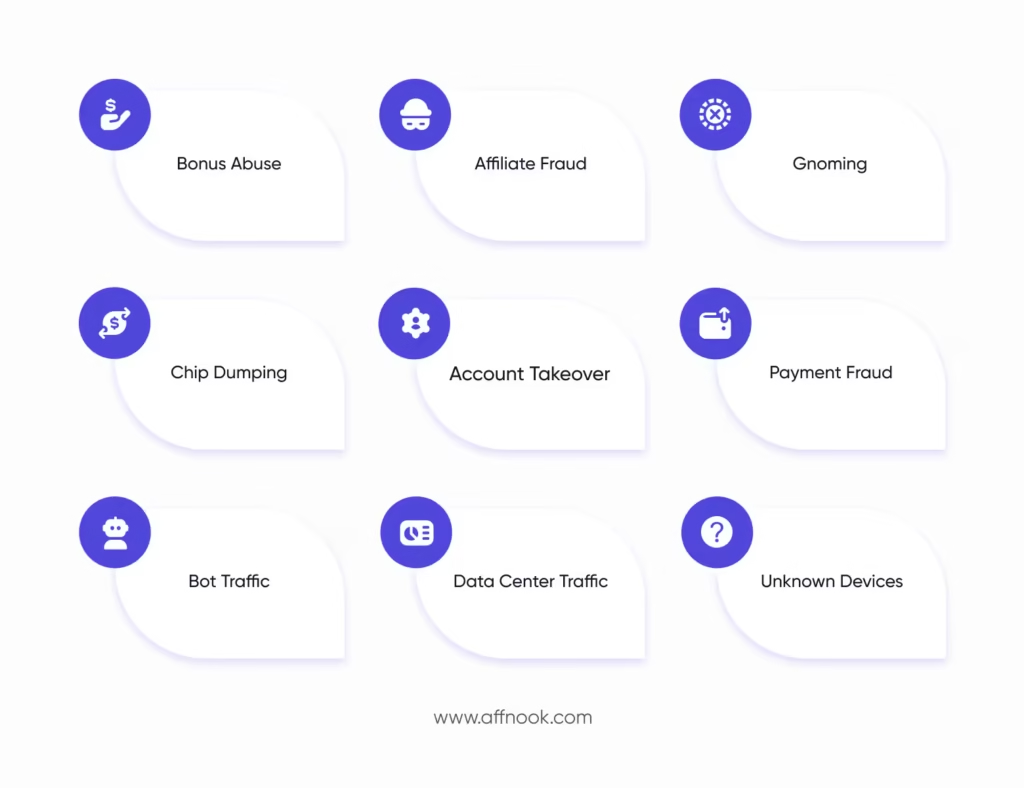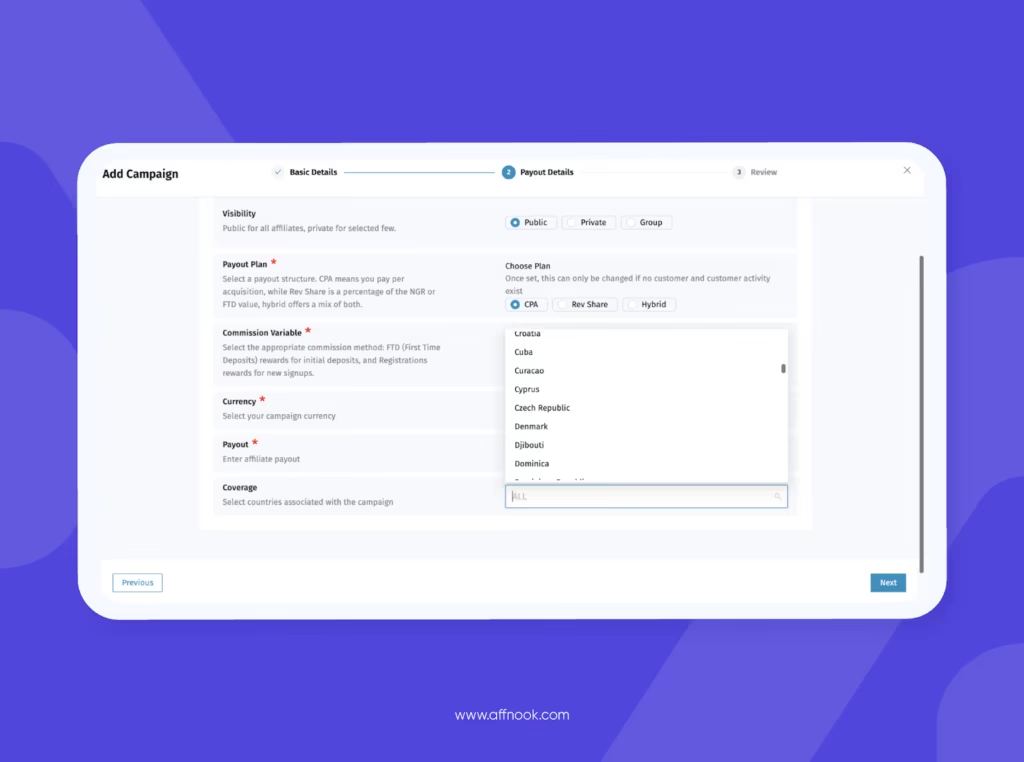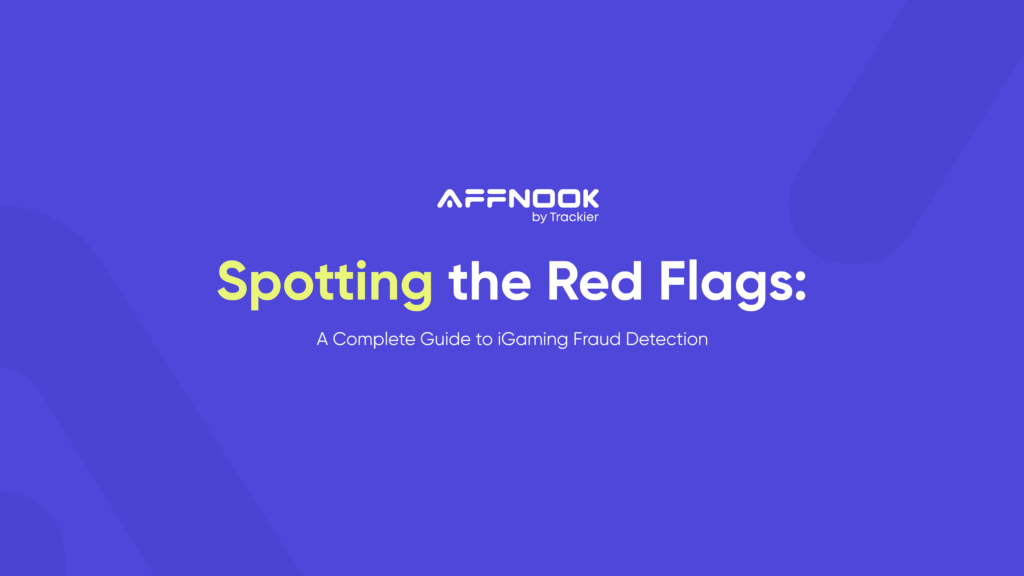iGaming fraud has increased by 64% between 2022 and 2024 with bonus abuse, payment system fraud, money laundering, and opposite betting being the most common. And frauds will continue to be rampant with more money being circulated in this expanding domain, making advanced igaming fraud detection more critical than ever.
The decentralized nature of the iGaming industry brings in distinctive fraud vectors not encountered by conventional iGaming operators. Hence, affiliate managers and operators must adopt innovative iGaming fraud detection measures to build a safe and responsible iGaming ecosystem.
This post shares interesting insights on iGaming fraud detection.
What Is iGaming Fraud?
iGaming fraud involves scams that target players and operators. It takes several forms including account takeovers, affiliate fraud, use of illegitimate websites, and creating multiple accounts among others.
Affiliates promote online games, like casinos, sportsbooks, poker rooms, and other iGaming platforms to earn a commission. However, such affiliate campaigns are often misused by fraudsters.
Affiliate fraud is rampant, negatively affecting the revenue, operational costs, and reputation of operators. It often leads to license suspension.
To maintain the integrity of their marketing channels, iGaming companies must prioritize fraud prevention and leverage robust fraud detection tools.
Let’s look at the various types of iGaming fraud impacting operators and players.
Scope and Types of iGaming Fraud
Fraudsters use various methods to launch an attack against iGaming operators, online casinos, and betting shops. Let’s explore them in detail.
Bonus Abuse
Bonus abuse occurs when users exploit promotional offers such as joining bonuses and creating multiple accounts. This way, they claim the bonuses more than once.
This is a violation of iGaming operators’ incentives to encourage sign-ups and retain players. When players repeatedly use these offers, they drain their budget, thus impacting profitability.
Affiliate Fraud
Affiliate fraud occurs when affiliates generate traffic impressions through links by false means. Such activities only create a facade of engagement and do not yield real profits.
They may use fake sign-ups to register several accounts and earn commissions.
The nature of the iGaming industry makes it the prime target for such frauds. This type of fraud is pretty common because of the lack of direct oversight, the vast scale of campaigns, and the complexity of affiliate programs.
The most common types of affiliate fraud are fake referrals, bot attacks, cookie placing, brand bidding, URL hijacking, incentives to inflate the referred players, identity fraud, unlicensed ads, and others.
Gnoming
Imagine you open an account on a gaming platform and invite your friends and family to join it, too. How to differentiate if the account is truly theirs or just in their name?
It could also be possible that someone created these fake accounts to increase probability. These are gnome accounts, which make it hard to detect fake accounts and suspicious activities and, therefore, lead to iGaming fraud.
Chip Dumping
Chip dumping is when players lose to opponents on purpose based on a mutual agreement to share profits. This is often seen in poker games when one player dumps the chips onto the other.
This allows the other player to cash out large sums of money without raising any suspicion. This type of iGaming fraud attempt is hard to detect.
Account Takeover
Account takeover, or ATO, is a fraudulent act in which a hacker gains control over a player’s account through phishing or other data breach methods. This is often done through fake links, where the player inadvertently enters login details, which are then captured by the hacker.
Through ATO, hackers can withdraw the player’s funds, steal personal information, or engage in other fraudulent activities through this account.
Payment Fraud
Payment fraud can happen in multiple ways, such as using a stolen credit card and making false transactions. It also involves identity theft, where the perpetrator pretends to be someone else, in this case, a player, by using their sensitive information and making payments.
Another payment fraud is claiming chargebacks, where players dispute legitimate transactions to get their money back–while enjoying the benefits of the payments.
Bot Traffic
Bot traffic refers to fraudulent activity in which automated scripts or bots simulate legitimate player activity. This can skew analytics, exploit the bonuses for real players, and lead to other malicious activities.
This makes it hard for the iGaming companies to distinguish between real and fraudulent players. These types of iGaming fraud threats are a growing concern for the industry.
Data Center Traffic
Data center traffic involves using data centers to misguide the origin of fraudulent activities. Fraudsters can overcome measures, such as IP blocks, put in place on a network level to detect and prevent fraud.
This disguises the true location, leading to the perpetrator getting away with such activities.
Unknown Devices
These are devices running on obsolete operating systems or unfamiliar device types. They need to be treated as such and can be used as an indicator of a fraud attempt.

How iGaming Frauds Impact Operators and Players
As an iGaming operator, it is essential to understand the repercussions of fraud to combat them. Here’s how iGaming frauds impact operators and players alike.
Impact of iGaming Fraud on Operators
- Financial losses from iGaming fraud like bonus abuse and chargebacks (friendly fraud), are increasing. In 2023, 74% of US merchants reported a surge in chargebacks.
- Research shows up to 15% of iGaming’s gross revenue is lost to promo abuse and fraud.
- Ignoring iGaming fraud triggers a chain reaction of operational inefficiencies marked by labor-intensive manual reviews conducted by sizable fraud analyst teams.
- Regulatory issues such as fraudulent activities open up a lieu of non-compliance issues. The company is fined and often loses its operating licenses.
- An IBM Report reveals that 49% of users will stop engaging with a business after an incident of fraud. Public incidents of fraud severely damage an operator’s reputation, leading to diminished player trust and reduced engagement.
- Owing to the loss of trust over non-compliance and fraud, payment operators may blacklist operators, impacting their reputation.
iGaming Fraud Impact on Players
The consequences players suffer owing to iGaming fraud are beyond financial losses. Fraudulent iGaming practices skew the fairness of games, compromise player security, and diminish their trust in online gaming platforms.
A few online games incorporate an element of chance, creating opportunities for fraud and putting gamers, especially young players at the risk of addiction. A large cohort of players are also subjected to emotional abuse and bullying.
Also read: How to Gamble Responsibly
Top 11 Red Flags in Fraud Detection
Fraudsters often leave a trail that connects them to the crime. Here are a few tell-tale signs you should look out for.
Unusual Account Activity
Here’s what you may notice –
- A sudden increase in betting amounts
- Multiple changes to the personal information
Consider this scenario. A user has been making modest bets. Suddenly, they bet large amounts. Keep an eye on such a sudden behavior change, this could be a fraud attempt.
Such activities could indicate money laundering or account takeover, leading to financial losses and regulatory issues.
Multiple Accounts
Multiple accounts with similarities are a huge indicator of a fraud attempt. Here are some scenarios –
- Same IP addresses
- Similar names
- Different names with the same personal details like social security number
Consider this – John Smith, John S, or S John from the same IP address trying to create accounts to abuse the joining bonus.
Such activities are suspicious. Thus, a strong KYC (Know Your Customer) procedure must be set up to reduce fraud.
Invalid Personal Details
Invalid personal details appear like fake names, addresses, or social security numbers that don’t exist in any legitimate record.
For example: A user registers with a fictitious name like “Jane Doe” just to create an account with an invalid address.
Unusual Login Patterns
Unusual login patterns look like these scenarios:
- Logins from multiple different locations within a short period
- Logins at odd hours
- Rapid succession logins
For example: If a user logs in from Spain and within the next hour, logs in from India, then that is a clear indication of fraud.
This activity could indicate multiple people sharing the account, the user becoming a victim of account takeover or bot activity. The usage of user behavior analytics and geo-location tracking with an MFA prompt to verify the users can help.
High Volume of Transactions in a Short Time
If there is a large number of high-volume transactions in a shorter timeframe from a certain user, this could indicate automated activity, such as bot usage or attempts at manipulating winning odds and the game outcome.
For example: A user has placed over a hundred bets in a few minutes.
This activity is unfair to other players, can cause financial losses to the operators, and disrupt usual operations.
Inconsistent User Information
Usually, user information remains consistent even after a certain period unless they are using fake accounts. Inconsistent information can look like:
- Changes in the spelling of their name across the account
- Different addresses added
- Incorrect phone numbers
For example: A user provides a certain address and phone number the first time, but the next time there are subtle changes in it.
This often indicates account manipulation, identity theft, or intent to defraud.
Unusual Payment Methods
When users use payment methods like prepaid cards or cryptocurrencies, you have to be more vigilant of their transactions. They are valid payment methods and hence cannot directly relate it to fraud.
This can lead to issues with compliance and losses. To avoid it, you can limit the payment methods and increase verification methods for high-risk transactions.
Frequent Account Recovery Request
Users often forget their passwords, however, if there are multiple recovery requests, then it could be an attempt to hijack an account.
For example: A user frequently says forgot their password and can’t enter the security questions either and requests to change verification methods.
This could lead to the loss of user personal information because of account takeovers. However, if you strengthen account recovery options and track repeated information, you can recognize these attempts sooner.
Abnormal Winning Patterns
Unusual winning streaks that don’t align with the normal gameplay cannot always be sheer luck, it could indicate collusion, cheating, or software manipulation.
For example, a user is constantly placing large bets, and despite different game instances, they win multiple times.
This can undermine the game’s integrity, and if the word spreads, other players are likely to stop using that platform.
Suspicious Affiliate Activity
This includes affiliates who engage in suspicious activity by driving fake traffic, generating false leads, altering or duplicating invoices, and more.
For example: The affiliate is constantly generating leads that result in minimal engagement or making multiple chargeback attempts.
This can negatively impact the affiliate program and waste marketing spend. Therefore it is essential to monitor the affiliate’s performance metrics using an iGaming affiliate marketing platform that offers detailed insights in this matter.
High Chargeback Rate
Frequent chargebacks are a red flag as they could indicate the usage of stolen credit cards or simply attempting to make payments they don’t mean to retain.
For example, a user regularly makes high deposits and then disputes the transaction by claiming it was never authorized.
This can lead to financial losses, increased transaction fees, fines from payment processors, etc. Therefore, you should monitor and analyze payment patterns for chargebacks relative to betting activity and deposits.
The Pain of Manually Detecting iGaming Frauds
Manual fraud detection can be a huge pain for iGaming operators and affiliate managers.
- It is energy and time-consuming – the team could rather spend time in revenue-generating activities
- The process is prone to errors
- It requires constant vigilance
iGaming fraud detection often requires a tactical approach to dealing with experienced fraudsters who use the latest tech to beat the system. Manually tracking activities will not be fast enough to spot and tackle fraud. Plus, it cannot prevent fraud attempts at scale.
Digital fraud prevention for iGaming is an ongoing process that requires constant vigilance and adaptation to new fraud tactics and technologies. This is why iGaming companies need to look into advanced technology, which is the right investment—a trade-off that will yield profits in the long run.
Tackling iGaming Fraud Like a Pro with Affnook
iGaming fraud detection is best tackled with a technologically-advanced provider that understands the complexity of iGaming fraud and offers a fitting solution to deal with it.
Affnook is an iGaming affiliate marketing platform tailored to the needs of iGaming businesses. It has an in-built advanced fraud detection tool to block fraud traffic from data centers, blacklisted IPs, and unknown devices without manual analysis of attribution data.
Affnook lets you nip fraud traffic in the bud with its advanced features.
Here’s what sets us apart in iGaming fraud detection!

- Real-Time Fraud Detection: Affnook’s anti-fraud tool operates in real-time, providing immediate alerts and actions against potential fraud.
For us, real-time means minutes, not hours!
With Affnook you can –
- Block Data Center Traffic: Reject traffic sent from data centers like AWS, GCP, etc. often used by frauds.
- Blacklist Repeat Offenders: Reject the traffic coming from Blacklisted IP database, which was marked fraud by the web.
- Allow Traffic Only from Known Devices: Customize or whitelabel the tracking links.
- Block Proxy Traffic: Frauds will not hide behind VPNs anymore. Our robust fraud shield blocks traffic sent from proxy IPs.
- Advanced Analytics: Gain deeper insights into affiliate performance and detect anomalies pointing to fraudulent activities. Our intuitive reporting dashboard allows you to see what’s working and spot suspicious activity instantly.
- Comprehensive Reporting: Access detailed reports on fraud attempts and actions taken, strengthening your fraud prevention strategies. We offer granular data on fraudulent activities, not letting you miss anything suspicious.
- Manage Chargebacks: Measure the actual campaign success with full chargeback visibility.
- Seamless Integration: With our seamless 2-way API integration you can easily integrate Affnook with your existing systems to streamline fraud detection and management processes.
- Customizable Settings: Tailor the fraud detection settings and tech stack to suit your specific business needs.
What’s more? Affnook offers ‘Features on Request’ in case you need something specific to tackle fraud. You’ll be surprised at our quick turnaround time!
- Dedicated Customer Support: Affnook’s team is available 24/7 on call and chat to help you navigate the complexities of iGaming fraud.
You will also have a dedicated customer success manager whose top priority is your success and to help you combat fraud.
With all its power-packed features, Affnook has a ~90% fraud detection rate.
So, you can be assured that your business, data, and customers are safeguarded from fraud.
Summing Up
The iGaming fraud scenario is complicated and negatively impacts your revenue, trust, and reputation. It can be tough to detect fraud, given the innovative means fraudsters use to trick players and operators.
Your best bet is to rely on the expertise of those who know fraud detection like the back of their hands. Trust Affnook for its brilliant fraud detection and resolution capabilities and take your iGaming business to the next level. Book a free demo with Affnook now to experience how we take iGaming fraud head-on.
Help Centre
What types of fraud commonly affect iGaming platforms?
Common iGaming fraud includes bonus abuse, affiliate fraud by fake referrals, gnoming, chip dumping, account takeovers, payment fraud, bot traffic, and disguised data-center traffic from malicious sources.
How does bonus abuse impact iGaming operators?
Bonus abuse happens when players exploit promotions by creating multiple accounts to repeatedly claim offers, draining marketing budgets and reducing profitability by exploiting incentives meant for real player retention.
What is affiliate fraud?
Affiliate fraud involves dishonest affiliates generating fake referrals or bot-driven traffic that inflates engagement and conversions without real player activity, leading to wasted budget and inaccurate performance data.
How does data center or proxy traffic relate to fraud?
Fraudsters often use data centers or proxy networks to hide true locations, making it harder to detect bots or fake accounts, which skews analytics and undermines traffic truthfulness.



